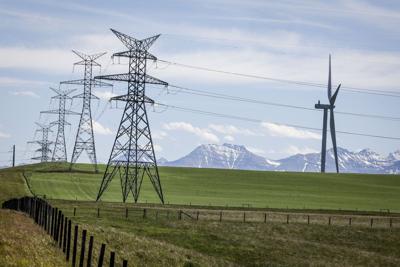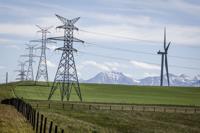OTTAWA - The federal government has pushed its target to achieve a net-zero electricity grid back 15 years to 2050 as part of new clean electricity regulations announced Tuesday — though officials maintain that target date was always the goal.
Canada had previously signalled an aim to fully decarbonize electricity grids by 2035. But some provinces, namely Alberta and Saskatchewan, said that was simply not doable.
Alberta Premier Danielle Smith swiftly responded to Ottawa's plan by saying her province would immediately mount a legal challenge because the regulations wade into provincial jurisdiction. She said that's a case Alberta fully expects to win.
The country's electricity grid is already substantially green, with 85 per cent of Canada's power supply coming from non-emitting sources. But four provinces — Alberta, Saskatchewan, Nova Scotia and New Brunswick — still rely on coal and natural gas to supply between 30 and 85 per cent of their power.
Committing to a net-zero electricity grid is an easy move for the other six provinces, which are already more than 90 per cent of the way there. The territories will be exempt from the regulations as most Northern communities rely on diesel-generation, and are relatively small emitters.
While most government communications in recent years referred specifically to achieving a net-zero emissions grid by 2035 — as part of Canada's overall goal to become a net-zero economy by 2050 — a government update in February on the regulations work signalled a shift in the timeline.
"We knew from the get-go, from where we are to where we need to be, we couldn't get there in 10 years — especially in light of the fact that the regulations only enter into force in 2035," said Environment Minister Steven Guilbeault, who has also previously spoke of Canada taking action to achieve a net-zero electricity grid by 2035.
"It was always our intention that we want to see things happening before 2035. But that we wouldn't be able to get to a decarbonized grid before 2050."
Guilbeault also pointed to how the regulations only come into effect in 2035 — as the draft regulations had also indicated.
"2035 is an important moment because although the regulation only enters into force then, the signal we send to those who will invest and operates grids starts now. They have basically 10 years to prepare," Guilbeault said.
Energy Minister Jonathan Wilkinson acknowledged the government could have been more precise in its language and context around what exactly the 2035 target referred to.
"So 2035 was really having a plan as to how you were going to reduce emissions to be able to get to a net-zero economy by 2050," Wilkinson said, pointing to how the United States also has similar regulations with similar timelines to achieve their net-zero electricity goals.
"Perhaps we were not as precise with our language as we should have been. And that's the same with the Americans, and it's same with all of the G7 countries. When they spoke the language of 2035, all of us understood that it was going to take longer than that to get to a net zero grid."
The final regulations, which will be published Wednesday, also project a lower reduction of greenhouse gas emissions than had previously been forecast in the draft regulations.Â
But Guilbeault explained part of the difference in projections was because emissions generated by cogeneration — where a single plant produces heat and electricity simultaneously — is instead being covered by the recently-announced oil and gas emissions cap. It was originally covered in the clean electricity draft regulations.
Such producers can produce their own heat and electricity, often at lower rates than they would otherwise be sourcing from a power grid.
"Because although these units produce electricity, it's mostly electricity that's consumed ... by the companies themselves who produce it," Guilbeault explained.
The finalized regulations provided more flexibility than last year’s draft for the provinces to comply with the changes. Those include changing to an annual emissions limit for power-producing units, along with a credit system where provinces can pool their total emissions limit across all units within a province.
"That's about ensuring that you're doing something that actually is going to work," Wilkinson said.
"At the end of the day we want Saskatchewan to succeed. We want Nova Scotia to succeed. We want New Brunswick and Alberta to succeed. But we also want to achieve a net zero grid by 2050."
However the flexibility brought little comfort to Alberta Premier Danielle Smith, who criticized the regulations as unconstitutional for regulating an area of provincial jurisdiction.
"We are gratified to see Ottawa finally admit that the Government of Alberta’s plan to achieve a carbon neutral power grid by 2050 is a more responsible, affordable and realistic target," Smith said in a statement.
"(The regulations) require generators to meet unreasonable and unattainable federally mandated interim targets beginning in 2035 that will still make electricity unaffordable for Canadian families."
Smith added that Alberta will be launching a court challenge to the regulations.
The government also announced $60 billion in support over the next 10 years for clean energy.
This report by Ďă¸ŰÁůşĎ˛ĘąŇĹĆ×ĘÁĎ was first published Dec. 17, 2024








































